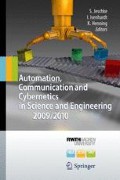Abstract
Today’s working and business life is characterized by broad economic and social trends. Due to these external effects, companies face an increasing demand for up-to-date knowledge in order to stay competitive. Microtraining is one answer to increasing organizational learning needs. Its methodology is based on the concept of short learning units, supporting workplace-related learning, which is especially important in the context of small and medium-sized enterprises (SMEs). Microtraining is time and cost-saving, highly flexible and can be tailored to organizational learning demands (short, medium and long term).
Access this chapter
Tax calculation will be finalised at checkout
Purchases are for personal use only
Preview
Unable to display preview. Download preview PDF.
References
E. Abele and et al. Wissensmanagement in KMU. Entwicklung einesWerkzeugkastensfür kleine und mittelständische Unternehmen. Zeitschrift für wirtschaftlichen Fabrikbetrieb, pages 375–379, 2003.
E. Aronson. The social animal. Worth/Freeman, New York, 2008. 10th ed.
A. Bandura. Social Learning Theory. Prentice Hall, New Jersey, 1977.
C. Bonwell and J. Eison. Active Learning: Creating Excitement in the Classroom AEHE-ERIC Higher Education Report No.1v. Jossey-Bass, Washington, D.C., 1991.
D. Butler and P.H Winne. Feedback and self-regulated learning: A theoretical synthesis.Review of Educational Research, 65:245–281, 1995.
J. Cross. Informal Learning: Rediscovering the Natural Pathways that Inspire Innovation and Performance. Pfeiffer, San Francisco, 2007.
S. Downes. E-learning 2.0. eLearn Magazine. www.elearnmag.org/subpage.cfm?section=articles&article=29-1, downloaded 2010-05-17, 2005.
O. Döring and S. Turnwald. Personalentwicklung in kleinen und mittleren Unternehmen:Anforderungen, Möglichkeiten, Grenzen und Perspektiven. Retrieved. www.f-bb.de/uploads/tx_fffbb/Fachartikel_PE_in_KMU_Doering.pdf, downloaded 2010-04-20, 2008.
P. de Vries and T. Leege. Final Report WP 1:Bedarfsanalyse. Reload project. DE/07/LLP-LdV/TOI/147058. Leonardo Project: European Union. Technical report, LeonardoProject: European Union., 2008.
N. Farvaque. Guide for Training in SMEs. DG Employment, Social Affairs and EqualOpportunities. European Commission. www.ec.europa.eu/social/main.jsp?langId=en&catId=89&newsId=544&furtherNews, downloaded 2010-05-10, 2009.
Bundesinstitut für Berufsbildung. Weiterbildungsbeteiligung in KMU. www.kibb.de/cps/uploads/559_Weiterbildung_in_KMU_Antwort1.1219152837800.pdf, downloaded2010-04-20, 2008.
H. J. Hartman. Metacognition in Learning and Instruction: Theory, Research and Practice. Kluwer Academic Publishers, Dordrecht, 2001.
A. Holzinger, A. Nischelwitzer, and M. Meisenberg. Mobile Phones as a Challengefor m-Learning: Examples for Mobile Interactive Learning Objects (MILOs). In 3rd International Conference on Pervasive Computing and Communication (IEEE), pages 307–311, 2005.
D.L. Kirkpatrick. Another look at evaluating training programs. American Society forTraining & Development, Alexandria, VA:, 1998.
R. Mayer. Should there be a three-strikes rule against pure discovery learning? Thecase for guided methods of instruction. American Psychologist, 59:14–19, 2004.
Microteaching - modular teaching and learning solutions for a needs based education.www.microteaching.org, downloaded 2010-05-10, 2007.
Microtraining for effective learning. www.microtraining.eu, downloaded 2010-05-10,2010.
Shared mental models, team coordination, and team performance. In Symposium conducted at the annual meeting of the Society for Industrial and Organizational Psychology, Orlando, FL.
I. Nonaka and H. Takeuchi. The knowledge creating company: how Japanese companies create the dynamics of innovation. Oxford University Press, New York, 1995.
Conference Board of Canada. Workplace Learning in Small and Medium-sized Enterprises:Effective Practices for Improving Productivity and Competitiveness. OverviewReport. 2009. http://www.ccl-cca.ca/pdfs/OtherReports/CBofC-WorkplaceLearning-SME-OverviewReport.pdf, downloaded 2010-04-28.
Peter Pawlowsky, Lutz Gerlach, Stefan Hauptmann, and Annett Puggel. Wissen alsWettbewerbsvorteil in kleinen und mittelständischen Unternehmen. Empirische Typologisierungen auf Grundlage einer bundesweiten Befragung. FOKUS prints 09/06. Technical Report 09/06, Technische Universität Chemnitz, Chemnitz, 2006.http://www.tu-chemnitz.de/wirtschaft/bwl6/prints/fokus_prints_09-06.pdf , downloaded2010-04-20.
G. Probst, S. Raub, and K. Romhardt. Wissen managen. Wie Unternehmen ihre wertvollste Ressource optimal nutzen. Gabler, Wiesbaden, 1999.
R. Verburg and et al. Managing Technology and Innovation. An introduction. Routledge, Oxford, 2006.
L. Vygotsky. Mind in Society. Harvard University Press, London, 1978.
H.K. Wahren. Das lernende Unternehmen: Theorie und Praxis des organizationalen Lernens. Gruyter, Berlin/New York, 1996.
D. Weinberger. Small pieces loosely joined: A unified theory of the web. Basic Books, New York, 2002.
Author information
Authors and Affiliations
Corresponding author
Editor information
Editors and Affiliations
Rights and permissions
Copyright information
© 2011 Springer-Verlag Berlin Heidelberg
About this paper
Cite this paper
Thelen, A.C., Herr, S.D., Hees, F., Jeschke, S. (2011). Microtraining for Workplace-Related Learning. In: Jeschke, S., Isenhardt, I., Henning, K. (eds) Automation, Communication and Cybernetics in Science and Engineering 2009/2010. Springer, Berlin, Heidelberg. https://doi.org/10.1007/978-3-642-16208-4_31
Download citation
DOI: https://doi.org/10.1007/978-3-642-16208-4_31
Published:
Publisher Name: Springer, Berlin, Heidelberg
Print ISBN: 978-3-642-16207-7
Online ISBN: 978-3-642-16208-4
eBook Packages: Mathematics and StatisticsMathematics and Statistics (R0)

